Ditapis dengan
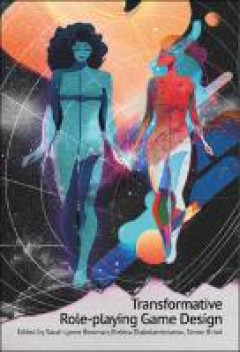
E-book Transformative Role-playing Game Design
This textbook describes theory and practice in analog role-playing game (RPG) design that encourage specific transformative impacts in participants, including tabletop, live action role-playing (larp), and Nordic and American freeform. We describe three types of transformative RPGs: transformative leisure, therapeutic, and educational. We present our model of nano-game design, offering recommen…
- Edisi
- -
- ISBN/ISSN
- 9789151323015
- Deskripsi Fisik
- -
- Judul Seri
- -
- No. Panggil
- 794.8 BOW t
E-book Religion and Social Marginalization in Zimbabwe
In each and every society, certain groups of people are ‘marginalized’. By marginalization here we mean being disregarded, ostracized, harassed, disliked, persecuted, or generally looked down upon. Such people often include women and children, the poor, the disabled, people of different sexual orientation, ethnic minorities, religious minorities, refugees, among others. In short, the …
- Edisi
- -
- ISBN/ISSN
- 9783863097455
- Deskripsi Fisik
- 264 hlm
- Judul Seri
- -
- No. Panggil
- 200.19 CHI r
E-book Psychological Abuse : A Discussion Paper
This paper is a review of research on psychological abuse in interpersonal and family relationships including in settings such as long-term care residences. There is no simple definition of psychological abuse. Generally, researchers and front line service providers define it as the systemic destruction of a person’s self-esteem and/or sense of safety, often occurring in relationships where t…
- Edisi
- -
- ISBN/ISSN
- 9780662489948
- Deskripsi Fisik
- 37 hlm
- Judul Seri
- -
- No. Panggil
- 150 DOH p
E-book The Muses of Truth and Transformation
The key event in this first part of the tale occurs when the old fisherman innocently opens the sealed flask he found, and the Djinn materializes from the bottle, and threatens to kill the old man. How are we to interpret this opening event?If this were someone’s dream, a common psychological interpretation would be that the Djinn, imprisoned in the bottle, represents a repressed, unconscious…
- Edisi
- -
- ISBN/ISSN
- 9781003471028
- Deskripsi Fisik
- 184 hlm
- Judul Seri
- -
- No. Panggil
- 150.1 CHI t
E-book Thirteen Fundamental Psychological Needs
Although individuals may have different goals and wishes on the surface, deep down we all want the same things. Our fundamental needs are universal: Regardless of culture, age, and lifestyle, everyone ultimately has the same set of needs. Needs are the basic requirements for our functioning and the nutriments for our well-being and advancement. We can only fully develop and flourish if all our …
- Edisi
- -
- ISBN/ISSN
- 9789463841856
- Deskripsi Fisik
- -
- Judul Seri
- -
- No. Panggil
- 150 DES t
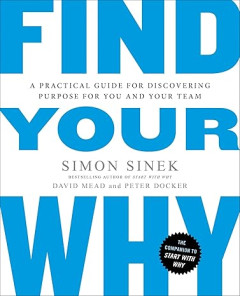
E-book Find Your Why: A Practical Guide for Discovering Purpose for You and Y…
Now Find Your Why picks up where Start With Why left off. It shows you how to apply Simon Sinek’s powerful insights so that you can find more inspiration at work -- and in turn inspire those around you. I believe fulfillment is a right and not a privilege. We are all entitled to wake up in the morning inspired to go to work, feel safe when we’re there and return home fulfilled at the en…
- Edisi
- -
- ISBN/ISSN
- 9780143111726
- Deskripsi Fisik
- 154 halaman, ilus.
- Judul Seri
- -
- No. Panggil
- 152.4 SIN f
E-book The Land Is Our Community : Aldo Leopold’s Environmental Ethic for t…
his is a book about Aldo Leopold’s land ethic,1 a view he developed over the course of his lifetime, a view that was informed by his experiences as a hunter, forester, wildlife manager, ecologist, con-servationist, and professor. It culminated in the essay “The Land Ethic” in A Sand County Almanac, published posthumously after his untimely death at age sixty-one in 1948. It has been extre…
- Edisi
- -
- ISBN/ISSN
- 9780226834474
- Deskripsi Fisik
- 198 hlm
- Judul Seri
- -
- No. Panggil
- 155.9 MIL t

E-book Covered in Ink: Tattoos, Women and the Politics of the Body
A small dolphin on the ankle, a black line on the lower back, a flower on the hip, or a child’s name on the shoulder blade—among the women who make up the twenty percent of all adults in the USA who have tattoos, these are by far the most popular choices. Tattoos like these are cute, small, and can be easily hidden, and they fit right in with society’s preconceived notions about what is �…
- Edisi
- -
- ISBN/ISSN
- 9780814760000
- Deskripsi Fisik
- 216 halaman, ilus
- Judul Seri
- -
- No. Panggil
- 306.461.3 THO c
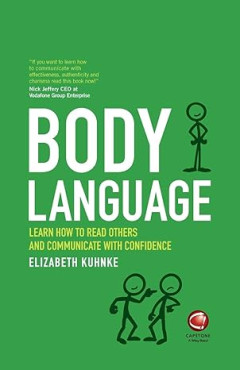
E-book Body Language: Learn How to Read Others and Communicate with Confidence
What does your body language say about you? From strangers on the street, to your closest friends and family – even if you're not speaking, you're saying a lot with your body. Body Language explores the way we use our bodies to communicate, the way we hold ourselves, the way we sit, stand, and point our hands, feet and eyes can all reveal how we are feeling in any given situation. This …
- Edisi
- -
- ISBN/ISSN
- 9780857087041
- Deskripsi Fisik
- 211 halaman
- Judul Seri
- -
- No. Panggil
- 153.6 KUH b
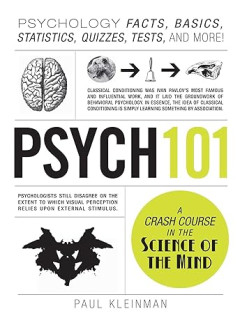
E-book Psych 101: Psychology Facts, Basics, Statistics, Tests, and More!
A hands-on approach to exploring the human mind Too often, textbooks turn the noteworthy theories, principles, and experiments of psychology into tedious discourse that even Freud would want to repress. Psych 101 cuts out the boring details and statistics, and instead, gives you a lesson in psychology that keeps you engaged - and your synapses firing. From personality quizzes and the Rors…
- Edisi
- -
- ISBN/ISSN
- 9781440543906
- Deskripsi Fisik
- 255 halaman, ilus.
- Judul Seri
- -
- No. Panggil
- 150.1 KLE p
E-book Dark Skies : Places, Practices, Communities
A fascination with the night sky is integral to the story of what it is to be human. The history of our relationship with dark skies is diverse and rich, a connection across space and time that has shaped and been shaped by society, culture, and reli-gion, as well as science. Beyond the astronomical, scientific understandings about the universe, the stars, planets, and moon have proved inspirat…
- Edisi
- -
- ISBN/ISSN
- 9781003408444
- Deskripsi Fisik
- 294 hlm
- Judul Seri
- -
- No. Panggil
- 150 ASF d

E-book Homo Educandus: Why Our School System is Broken and What We Can Do Abo…
Linnaeus, the Swedish taxonomist, was wrong when he named our species Homo sapiens, i.e. wise man. We are not. We do too many senseless, destructive and irresponsible things to deserve that label. Actually, we need to be educated. Fortunately, we can be educated. We can transform ourselves. We are Homo educandus. Sadly, our current school system is broken. In fact, it does not support education…
- Edisi
- -
- ISBN/ISSN
- 9789083178905
- Deskripsi Fisik
- 246 halaman, ilus.
- Judul Seri
- -
- No. Panggil
- 150.0 BRA h
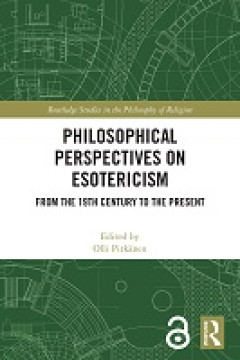
E-book Philosophical Perspectives on Esotericism: From the 19th Century to th…
This volume offers the first systematic philosophical study of esotericism and late modern philosophy. It addresses fundamental philosophical questions related to esotericism and reveals that esoteric ideas have had decisive impact on countless important philosophers, even if this fact has been neglected in contemporary philosophy. The first part of the book is dedicated to substantial and meth…
- Edisi
- -
- ISBN/ISSN
- 9781032599762
- Deskripsi Fisik
- 381 halaman
- Judul Seri
- -
- No. Panggil
- 001.9 PIT p

E-book Concepts at the Interface
Research on concepts has concentrated on the way people apply concepts online, when presented with a stimulus. Just as important, however, is the use of concepts offline, when planning what to do or thinking about what is the case. There is strong evidence that inferences driven by conceptual thought draw heavily on special-purpose resources: sensory, motoric, affective, and evaluative. At the …
- Edisi
- -
- ISBN/ISSN
- 9780198893660
- Deskripsi Fisik
- 270 halaman
- Judul Seri
- -
- No. Panggil
- 100 SHE c
E-book Calm the F*ck Down: How to Control What You Can and Accept What You Ca…
Tame anxiety and take back control of your life with this "genius" (Cosmopolitan) no-f*cks-given guide from the bestselling author of The Life-Changing Magic of Not Giving a F*ck and Get Your Sh*t Together. Do you spend more time worrying about problems than solving them? Do you let unexpected difficulties ruin your day and do "what ifs" keep you up at night? Sounds like you need to Calm the…
- Edisi
- -
- ISBN/ISSN
- 9780316529150
- Deskripsi Fisik
- 82 halaman
- Judul Seri
- -
- No. Panggil
- 150.1 KNI c
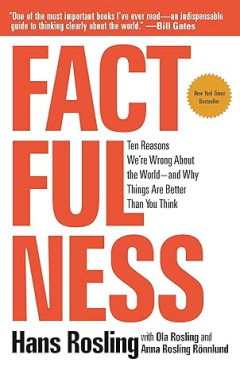
E-book Factfulness: Ten Reasons We're Wrong About the World--and Why Things A…
When asked simple questions about global trends?what percentage of the world’s population live in poverty; why the world’s population is increasing; how many girls finish school?we systematically get the answers wrong. So wrong that a chimpanzee choosing answers at random will consistently outguess teachers, journalists, Nobel laureates, and investment bankers. In Factfulness, Professor …
- Edisi
- -
- ISBN/ISSN
- 9781250107817
- Deskripsi Fisik
- 273 halaman
- Judul Seri
- -
- No. Panggil
- 150.1 ROS f
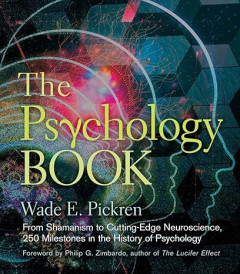
E-book The Psychology Book: From Shamanism to Cutting-Edge Neuroscience, 250 …
What could be more fascinating than the workings of the human mind? This stunningly illustrated survey in Sterlings Milestones series chronicles the history of psychology through 250 landmark events, theories, publications, experiments, and discoveries. Beginning with ancient philosophies of well-being, it touches on such controversial topics as phrenology, sexual taboos, electroshock therapy, …
- Edisi
- -
- ISBN/ISSN
- 9781402784811
- Deskripsi Fisik
- 586 halaman, ilus.
- Judul Seri
- -
- No. Panggil
- 150.0 PIC t
E-book Representing Poverty and Precarity in a Postcolonial World
“Precarity is everywhere today”, French sociologist Pierre Bourdieu announced in a lecture in 1997 (qtd. in Springveld 26). “[P] recarity is not a passing or episodic condition, but a new form of regulation that distinguishes this historical time”, American philosopher Judith Butler writes in her foreword to German political theorist Isabell Lorey’s study State of Insecurity: Governme…
- Edisi
- -
- ISBN/ISSN
- 9789004466395
- Deskripsi Fisik
- 302 hlm
- Judul Seri
- -
- No. Panggil
- 801.9 CLI r
E-book Averting Disaster Before It Strikes : How to Make Sure Your Subordinat…
Compelling evidence from industrial working practice demonstrates that in many critical infrastructure companies, decision-makers find it difficult to get objective information about safety and technological risks. Management theory postulates that executives manage their subordinates through information: they receive information from various sources, proce…
- Edisi
- -
- ISBN/ISSN
- 9783031307720
- Deskripsi Fisik
- 390 hlm
- Judul Seri
- -
- No. Panggil
- 158.7 CHE a
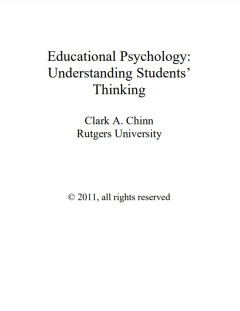
E-book Understanding Psychology: Understanding Students' Thinking
This textbook is about how students learn and how teachers can teach well. Although this textbook assumes no prior knowledge about educational research, it is intended to be much more than just an “introduction” that will lay the groundwork for you to learn to teach later on. On the contrary, as you read this book, you will learn theory- and research-based skills that you could apply right …
- Edisi
- -
- ISBN/ISSN
- -
- Deskripsi Fisik
- 418 halaman
- Judul Seri
- -
- No. Panggil
- 370.15 CHI u
E-book Trade Unions on YouTube : Online Revitalization in Sweden
This chapter briefly describes the goal and general argument of the book, along with its theoretical framework and data collection, and introduces the Swedish case. First, we set the discussion of labour movements’ trade union revitalization and usage of social media—and particularly of YouTube—into the broader context of scholarly liter-at…
- Edisi
- -
- ISBN/ISSN
- 9783030249144
- Deskripsi Fisik
- 170 hlm
- Judul Seri
- -
- No. Panggil
- 158.7 JAN t
E-book Psychology of Space Exploration: Contemporary Research in Historical P…
This e-book explores some of the contributions of psychology to yesterday’s great space race, today’s orbiter and International Space Station missions, and tomorrow’s journeys beyond Earth’s orbit. Early missions into space were typically brief, and crews were small, often drawn from a single nation. As an intensely competitive space race has given way to international cooperation over …
- Edisi
- -
- ISBN/ISSN
- -
- Deskripsi Fisik
- 266 halaman, ilus.
- Judul Seri
- -
- No. Panggil
- 155.9 NAS p
E-book Death and the Pearl Maiden : Plague, Poetry, England
As recent discussions in medieval studies have demonstrated, however, the response of literature to history—the witness that literature provides within history—is never a straightforward one. It is, at this point, impossible to state flatly that texts such as the Decameron, Guillaume de Machaut’s Jugement dou Roy de Navarre, or William Langland’s Piers Plowman stand as “accu…
- Edisi
- -
- ISBN/ISSN
- 9780814213902
- Deskripsi Fisik
- 236 hlm
- Judul Seri
- -
- No. Panggil
- 801.9 COL d
E-book The Secret to Teen Power
The truth is, THE SECRET helps bring riches to the poor, abundance to the hungry, peace to the war-torn, wellness to the unhealthy. But it can also help make dreams come true for you. Maybe you don’t think you deserve it. But you do. And if you can dream it, you have the power to make it happen. Seriously. Now, it might seem obvious, but the hardest part about living your dream is knowing jus…
- Edisi
- -
- ISBN/ISSN
- 9781847386939
- Deskripsi Fisik
- 169 hlm
- Judul Seri
- -
- No. Panggil
- 155.5 HAR t
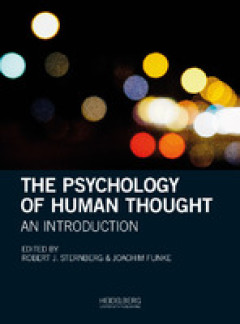
E-book The Psychology of Human Thought: An Introduction
The “Psychology of Human Thought” is an “open access” collection of peer-reviewed chapters from all areas of higher cognitive processes. The book is intended to be used as a textbook in courses on higher process, complex cognition, human thought, and related courses. Chapters include concept acquisition, knowledge representation, inductive and deductive reasoning, problem solving, metac…
- Edisi
- -
- ISBN/ISSN
- 9783947732340
- Deskripsi Fisik
- 418 halaman, ilus.
- Judul Seri
- -
- No. Panggil
- 150.1 STE t
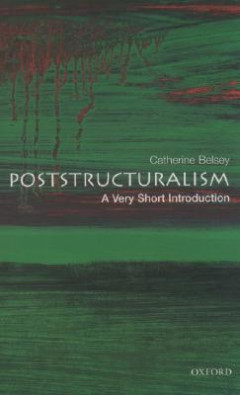
E-book Poststructuralism: A Very Short Introduction
Poststructuralism changes the way we understand the relations between human beings, their culture, and the world. Following a brief account of the historical relationship between structuralism and poststructuralism, this Very Short Introduction traces the key arguments that have led poststructuralists to challenge traditional theories of language and culture. While the author discusses such we…
- Edisi
- -
- ISBN/ISSN
- 0192801805
- Deskripsi Fisik
- 105 halaman, ilus.
- Judul Seri
- -
- No. Panggil
- 100 BEL p 002849-eB-0122
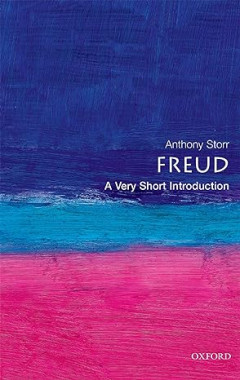
E-book Freud: A Very Short Introduction
Sigmund Freud, the founder of psychoanalysis, developed a totally new way of looking at human nature. Only now, with the hindsight of the half-century since his death, can we assess his true legacy to current thought. As an experienced psychiatrist himself, Anthony Storr offers a lucid and objective look at Freud's major theories, evaluating whether they have stood the test of time, and in the …
- Edisi
- -
- ISBN/ISSN
- 0192854550
- Deskripsi Fisik
- 177 halaman
- Judul Seri
- -
- No. Panggil
- 150.1 STO f 002831-eB-0122

E-book Forensic Psychology: A Very Short Introduction
Lie detection, offender profiling, jury selection, insanity in the law, predicting the risk of re-offending , the minds of serial killers, and many other topics that fill news and fiction are all aspects of the rapidly developing area of scientific psychology broadly known as Forensic Psychology. This fascinating Very Short Introduction discusses all the aspects of psychology that are relevant …
- Edisi
- -
- ISBN/ISSN
- 9780199550203
- Deskripsi Fisik
- 160 halaman
- Judul Seri
- -
- No. Panggil
- 614.1 CAN f
E-book Animal Emotions : How They Drive Human Behavior
Uually, our emotions are strongly controlled. Therefore, we seldom experience situations of raw affect, where emotions simply overwhelm us. This is basically a good thing, because controlling our ancestral emotional urges helps us to respond more appropriately to most of the daily situational demands of our modern society. It is simply not acceptable to always show an emotional response i…
- Edisi
- -
- ISBN/ISSN
- 9781950192915
- Deskripsi Fisik
- 161 hlm
- Judul Seri
- -
- No. Panggil
- 591.5 MON a
E-book The Anguished and the Enchanted : "The Little Prince," Revisited
t is true that Finns have done well to keep alive our tradi-tion of oral narrative: memorizing and performing stories, fa-bles, myths, and histories. In the nineteenth century, The Ka-levala — comprising ancient songs and tales transmitted orally for centuries — was arranged, printed, and almost immediately adopted by Finns as our ‘official’ national epic. I…
- Edisi
- -
- ISBN/ISSN
- 9781953035561
- Deskripsi Fisik
- 121 hlm
- Judul Seri
- -
- No. Panggil
- 155.4 BOW t
E-book Study Secrets
One of the first questions that students have when they start reading Study Secrets is ‘what actions should I take first?’. This book is packed with so much helpful information that it can be difficult to know where to start. A student who can read, but doesn’t act upon their reading, is really the same as a student who never reads at all. Acting upon the secrets you learn is the only way…
- Edisi
- -
- ISBN/ISSN
- 9780648874805
- Deskripsi Fisik
- 152 hlm
- Judul Seri
- -
- No. Panggil
- 370.15 CAS s
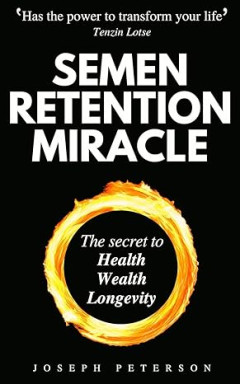
E-book Semen Retention Miracle: Secrets of Sexual Energy Transmutation for We…
Semen Retention is a centuries-old practice that allows you to harness your body’s vital energy and redirect it to any area of your life. From achieving the perfect body to outstanding results in business and creative endeavours, semen retention can turbocharge your success.
- Edisi
- -
- ISBN/ISSN
- -
- Deskripsi Fisik
- 132 halaman.
- Judul Seri
- -
- No. Panggil
- 155.3 PET s
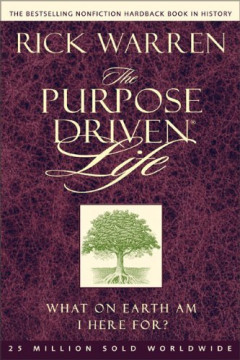
E-book The Purpose Driven Life: What on Earth Am I Here for?
The Purpose Driven Life will help you understand why you are alive and reveal God's amazing plan for you both here and now, and for eternity. Rick Warren will guide you through a personal forty-day spiritual journey that will transform your answer to life's most important question: What on earth am I here for? Knowing God's purpose for creating you will reduce your stress, focus your energy, si…
- Edisi
- -
- ISBN/ISSN
- 0310254825
- Deskripsi Fisik
- 340 halaman
- Judul Seri
- -
- No. Panggil
- 261.515 WAR t

E-book Mental Imagery: Philosophy, Psychology, Neuroscience
This book is about mental imagery and the important work it does in our mental life. It plays a crucial role in the vast majority of our perceptual episodes. It also helps us understand many of the most puzzling features of perception (like the way it is influenced in a top-down manner and the way different sense modalities interact). But mental imagery also plays a very important role in emoti…
- Edisi
- -
- ISBN/ISSN
- 9780198809500
- Deskripsi Fisik
- 321 halaman
- Judul Seri
- -
- No. Panggil
- 100 NAN m
E-book Dark Psychology Secrets
Has someone ever taken advantage of you for their benefit? Do you want to learn to defend yourself against Mental Manipulation or do you want to learn easy how to use Dark Psychology to get what you want from people without them even knowing it? You should know that most of our choices are generated and managed through the application of specific methods of Covert Manipulation. Knowing these …
- Edisi
- -
- ISBN/ISSN
- 9798555483072
- Deskripsi Fisik
- 124 halaman
- Judul Seri
- -
- No. Panggil
- 150.1 COO d
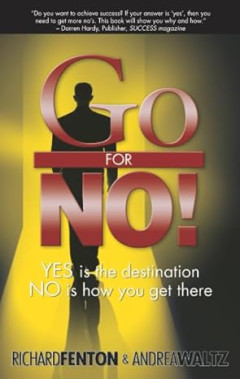
E-book Go for No! Yes is the Destination, No is How You Get There
What if the word "no" didn't slow you down, depress, or discourage you? Sticks and Stones May Break My Bones but “NO” Can Never Hurt Me! That’s the lesson twenty-eight year old copier salesman Eric Bratton is about to learn. And he’s going to learn it from the most unlikely of mentors - himself! Imagine going to bed one night, then to awaken the next morning in a strange house wi…
- Edisi
- -
- ISBN/ISSN
- 9780966398137
- Deskripsi Fisik
- 80 halaman
- Judul Seri
- -
- No. Panggil
- 158.1 FEN g
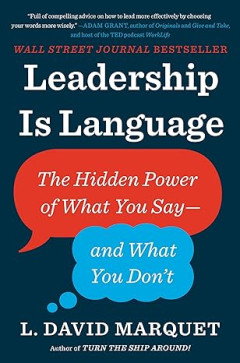
E-book Leadership Is Language: The Hidden Power of What You Say --and What Yo…
You might imagine that an effective leader is someone who makes quick, intelligent decisions, gives inspiring speeches, and issues clear orders to their team so they can execute a plan to achieve your organization's goals. Unfortunately, David Marquet argues, that's an outdated model of leadership that just doesn't work anymore. As a leader in today's networked, information-dense business cl…
- Edisi
- -
- ISBN/ISSN
- 9780735217539
- Deskripsi Fisik
- -
- Judul Seri
- -
- No. Panggil
- 158.4 MAR l
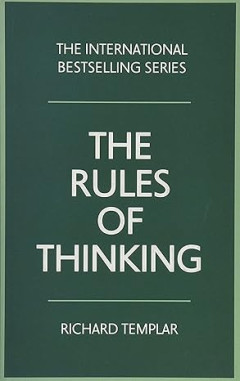
E-book Rules of Thinking, The: A Personal Code to Think Yourself Smarter, Wis…
We all envy the natural thinkers of this world. They have the best ideas, make the smartest decisions, are open minded and never indecisive. Is there something they know that the rest of us don't? Is it something we can all learn? The answer is a resounding yes. They know The Rules of Thinking. These Rules are the guiding principles that show you how to make wiser decisions, stop procrast…
- Edisi
- -
- ISBN/ISSN
- 9781292263809
- Deskripsi Fisik
- -
- Judul Seri
- -
- No. Panggil
- 100 TEM r
E-book Learning How to Learn: Psychology and Spirituality in the Sufi Way
In response to the many inquiries he has received about the Sufi tradition from people from all walks of life, leading Sufi expert Idries Shah presents a clarifying series of questions and answers that illustrates how traditional Sufi concepts can resolve our social, psychological, and spiritual problems.
- Edisi
- -
- ISBN/ISSN
- 9781784791087
- Deskripsi Fisik
- 376 halaman
- Judul Seri
- -
- No. Panggil
- 100 SHA l
E-book Pengukuran Psikologis
- Edisi
- -
- ISBN/ISSN
- 9786029187755
- Deskripsi Fisik
- xvi, 334 hlm, 148 x 210 mm.
- Judul Seri
- -
- No. Panggil
- 150.1 SUP p
- Edisi
- -
- ISBN/ISSN
- 9786029187755
- Deskripsi Fisik
- xvi, 334 hlm, 148 x 210 mm.
- Judul Seri
- -
- No. Panggil
- 150.1 SUP p
E-book Psychology : The Science of Mind and Behaviour
These theoretical differences partly reflect the complexity of the subject matter. Perhaps more importantly, there’s a very real sense in which we are all ‘Psychologists’ in our everyday lives: Psychologists as scientists/researchers use fundamental cognitive processes in order to investigate those same processes (such as perception and memory); hence, Psychologists (with an upper-case �…
- Edisi
- -
- ISBN/ISSN
- -
- Deskripsi Fisik
- 25 hlm
- Judul Seri
- -
- No. Panggil
- 150 GRO p
E-book Mind Change : How Digital Technologies are Leaving Their Mark on Our B…
Let’s enter a world unimaginable even a few decades ago, one like no other in human history. It’s a two-dimensional world of only sight and sound, offering instant information, connected identity, and the opportunity for here-and-now experiences so vivid and mesmerizing that they can outcompete the dreary reality around us. It’s a world teeming with so many facts and opinions that there w…
- Edisi
- -
- ISBN/ISSN
- 9780812993837
- Deskripsi Fisik
- 329 hlm
- Judul Seri
- -
- No. Panggil
- 155.9 GRE m
E-book Animal Communication
This e-book contains how animal's communication through signal, vision, audition acuity and many more.
- Edisi
- -
- ISBN/ISSN
- -
- Deskripsi Fisik
- 41 hlm
- Judul Seri
- -
- No. Panggil
- 591.5 TEA a
E-book Literature and Psychology : Writing, Trauma and the Self
Somewhere in the period after the peak of deconstruction as a literary/ critical method of textual analysis, a trend towards interdisciplinary crosspollination occurred. This trend is buttressed by the academic tearing down – usually by humanities departments – of the special status heretofore accorded to texts produced by disciplines that utilize the scientific method as their primary sour…
- Edisi
- -
- ISBN/ISSN
- 9781527520110
- Deskripsi Fisik
- 30 hlm
- Judul Seri
- -
- No. Panggil
- 801.9 CAK l

E-Book Students’ Collaborative Problem Solving in Mathematics Classrooms
This open access book provides key insights into the social fundamentals of learning and indications of social interactive modes conducive and restrictive of that learning in China. Combining theoretical and technical advances in an innovative research design, this book focuses on collaborative problem solving in mathematics to increase the visibility of social interactions in teachers’ desig…
- Edisi
- -
- ISBN/ISSN
- 9789819973866
- Deskripsi Fisik
- 297 halaman
- Judul Seri
- -
- No. Panggil
- 370.15 CAO s
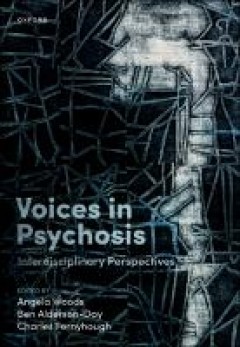
E-Book Voices in Psychosis: Interdisciplinary Perspectives
Voices in Psychosis: Interdisciplinary Perspectives deepens and extends the understanding of hearing voices in psychosis in a striking way. For the first time, this collection brings multiple disciplinary, clinical and experiential perspectives to bear on an original and extraordinarily rich body of testimony: transcripts of forty in-depth phenomenological interviews conducted with people who h…
- Edisi
- -
- ISBN/ISSN
- 9780192898388
- Deskripsi Fisik
- 272 halaman
- Judul Seri
- -
- No. Panggil
- 150 WOO v
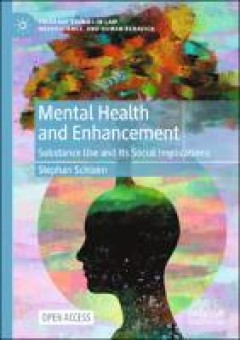
E-Book Mental Health and Enhancement: Substance Use and Its Social Implications
This book takes the reader from basic questions like “What is health?” and “What is a psychiatric disorder?”, into the midst of people’s present mental health and enhancement choices. More and more people receive psychiatric diagnoses and the use of psychopharmacological drugs keeps increasing. Concurrently, media report the popularity of “brain doping” or “study drugs” on cam…
- Edisi
- -
- ISBN/ISSN
- 9783031326189
- Deskripsi Fisik
- 141 halaman
- Judul Seri
- -
- No. Panggil
- 155.9042 SCH m
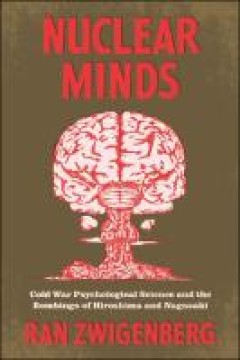
E-Book Nuclear Minds: Cold War Psychological Science and the Bombings of Hiro…
How researchers understood the atomic bomb’s effects on the human psyche before the recognition of Post-Traumatic Stress Disorder. In 1945, researchers on a mission to Hiroshima with the United States Strategic Bombing Survey canvassed survivors of the nuclear attack. This marked the beginning of global efforts—by psychiatrists, psychologists, and other social scientists—to tackle the com…
- Edisi
- -
- ISBN/ISSN
- 9780226825915
- Deskripsi Fisik
- 324 halaman
- Judul Seri
- -
- No. Panggil
- 616.89 ZWI n
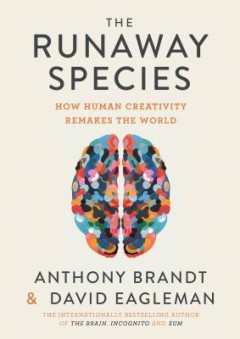
E-Book The Runaway Species: How Human Creativity Remakes the World
The Runaway Species is a deep dive into the creative mind, a celebration of the human spirit, and a vision of how we can improve our future by understanding and embracing our ability to innovate. David Eagleman and Anthony Brandt seek to answer the question: what lies at the heart of humanity’s ability—and drive—to create? Our ability to remake our world is unique among all living thin…
- Edisi
- -
- ISBN/ISSN
- 9781936787524
- Deskripsi Fisik
- 304 halaman
- Judul Seri
- -
- No. Panggil
- 150.1 EAG t
Leading Things You Didn't Start : Winning Big When You Inherit People, Places…
It's human nature to be fascinated by the new. Yet most leaders spend their days navigating preestablished cultures, processes, teams, and goals. They aren't paid to create things from scratch but instead are changed with overseeing, maintaining, and often rescuing what others started. Unfortunately, this isn't what most of us were trained to do, either in business school or in the places we fi…
- Edisi
- -
- ISBN/ISSN
- 9780525654049
- Deskripsi Fisik
- 14.5 x 22 cm; 191 hlm
- Judul Seri
- -
- No. Panggil
- 261.515 REA l
 Karya Umum
Karya Umum  Filsafat
Filsafat  Agama
Agama  Ilmu-ilmu Sosial
Ilmu-ilmu Sosial  Bahasa
Bahasa  Ilmu-ilmu Murni
Ilmu-ilmu Murni  Ilmu-ilmu Terapan
Ilmu-ilmu Terapan  Kesenian, Hiburan, dan Olahraga
Kesenian, Hiburan, dan Olahraga  Kesusastraan
Kesusastraan  Geografi dan Sejarah
Geografi dan Sejarah